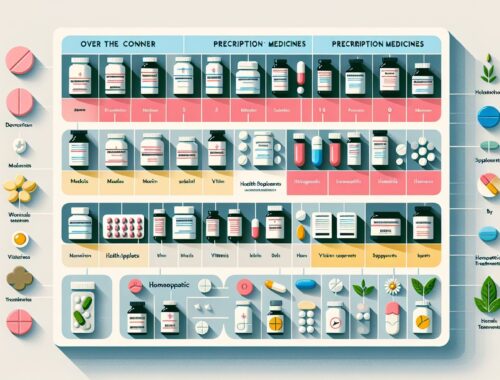
Exploring the Different Types of Medicines
When it comes to treating various ailments and illnesses, there are a wide range of medicines available to help alleviate symptoms and promote healing. From over-the-counter options to prescription medications, each type of medicine plays a unique role in maintaining our health and well-being. In this article, we will explore some of the different types of medicines and how they work to improve our overall health.
Over-the-Counter Medications
Over-the-counter (OTC) medications are readily available at pharmacies and grocery stores without the need for a prescription. These medications are designed to treat common ailments such as headaches, colds, allergies, and minor aches and pains. Examples of OTC medications include acetaminophen, ibuprofen, antihistamines, and cough syrups. It is important to carefully follow the instructions on the packaging and consult with a healthcare professional if you have any questions or concerns about OTC medications.
Prescription Medications
Prescription medications are prescribed by a healthcare provider to treat specific medical conditions and illnesses. These medications are typically stronger than OTC medications and may require closer monitoring by a healthcare professional. Prescription medications can be used to manage chronic conditions such as high blood pressure, diabetes, and depression, as well as to treat acute illnesses such as infections and injuries. It is important to take prescription medications as directed and to communicate with your healthcare provider about any side effects or concerns.
Herbal and Alternative Remedies
In addition to traditional medications, many people turn to herbal and alternative remedies to address their health concerns. These remedies may include herbal supplements, essential oils, acupuncture, and chiropractic care. While some people find relief from these alternative treatments, it is important to approach them with caution and to consult with a healthcare professional before incorporating them into your health routine. Some herbal remedies can interact with prescription medications and may not be safe for everyone.
Vaccines and Immunizations
Vaccines and immunizations play a crucial role in preventing infectious diseases and promoting public health. Vaccines work by stimulating the immune system to produce antibodies, which protect against specific viruses and bacteria. Common vaccines include those for influenza, measles, hepatitis, and human papillomavirus (HPV). By staying up to date on recommended vaccines, you can protect yourself and others from potentially serious illnesses.
In conclusion, the world of medicine is vast and diverse, with a range of options available to help us maintain our health and well-being. Whether you are reaching for an over-the-counter medication to ease a headache or receiving a prescription medication to manage a chronic condition, it is important to work closely with healthcare professionals to ensure the safe and effective use of medications. By understanding the different types of medicines available and how they work, we can make informed decisions about our health and seek the care we need to live our best lives.
You May Also Like

Understanding the Different Types of Medicines
April 11, 2024
Exploring the Different Types of Medicines
March 10, 2024

